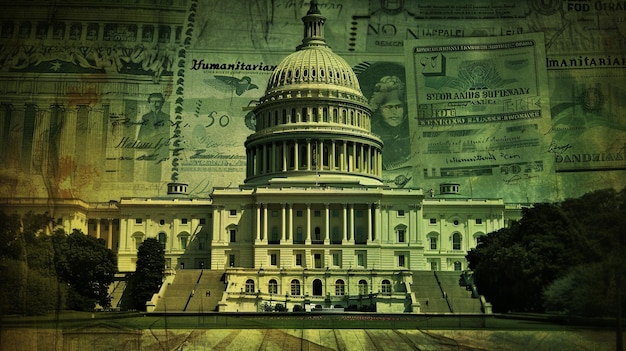Lobbying Groups: Shaping Public Policy Debate Agendas in the US

Lobbying groups play a pivotal role in the United States by influencing public policy debate agendas through strategic advocacy, research, and campaign contributions, thereby shaping the direction of legislative and regulatory outcomes.
Understanding the influence of lobbying groups in shaping public policy debate agendas is crucial for anyone interested in the workings of the US political system. These groups employ various strategies to advocate for their specific interests, often impacting the direction of legislative and regulatory outcomes.
Examining the Core Functions of Lobbying Groups
Lobbying groups serve as critical intermediaries between various interests and policymakers. They perform essential functions that shape the landscape of public policy debates.
These organizations are not monolithic entities; they vary significantly in their size, resources, and the specific interests they represent. This diversity allows for a broad spectrum of viewpoints to be presented and considered in the policy-making process.
Advocacy and Representation
One of the primary functions of lobbying groups is to advocate for the interests of their members.
- Representing Constituents: Lobbying groups represent a variety of constituents, including businesses, non-profit organizations, and individuals.
- Articulating Interests: They articulate the interests of these groups to policymakers.
- Promoting Agendas: They promote specific legislative and regulatory agendas.
Information Dissemination
Lobbying groups play a crucial role in disseminating information to policymakers.
- Providing Research: They often provide research and data to support their positions.
- Offering Expertise: They also offer expert testimony and analysis on complex issues.
- Educating Policymakers: By providing this information, lobbying groups help policymakers make more informed decisions.

In short, lobbying groups support the understanding and discussion around important policy issues by providing data, insights, and advocacy. This multifaceted role ensures that diverse perspectives are considered in the public policy arena.
Strategies Employed by Lobbying Groups
Lobbying groups utilize a range of tactics to influence public policy debate agendas, each designed to leverage their resources and access to policymakers. Understanding these strategies provides crucial insight into how these groups operate and exert influence.
These strategies can be broadly categorized into direct lobbying, indirect lobbying, and campaign finance activities. Each approach offers unique avenues for shaping policy outcomes.
Direct Lobbying
Direct lobbying involves direct communication with policymakers to advocate for specific legislative or regulatory changes.
- Meetings and Consultations: Lobbyists meet with policymakers and their staff to discuss the potential impacts of proposed legislation.
- Testimony: They provide testimony at congressional hearings.
- Drafting Legislation: They may even draft legislative language.
Indirect Lobbying
Indirect lobbying focuses on mobilizing public opinion to influence policymakers.
- Grassroots Campaigns: This can involve grassroots campaigns, media outreach, and public relations efforts.
- Shaping Public Opinion: The goal is to shape public opinion and create a groundswell of support for a particular issue.
- Coalition Building: Lobbying groups will often form coalitions with other organizations to amplify their message.
Campaign Finance Activities
Campaign finance activities represent another critical component of lobbying strategies.
- Contributions: Lobbying groups and their members often make campaign contributions to political candidates.
- Supporting Candidates: They support candidates who align with their interests.
- Building Access: Campaign contributions can help lobbying groups gain access to policymakers.
In conclusion, lobbying groups deploy a mix of direct and indirect strategies, combined with campaign finance activities, to maximize their influence on public policy debate agendas. This multifaceted approach allows them to engage policymakers, shape public opinion, and support political candidates who align with their interests.
The Role of Money in Lobbying
The influence of money in lobbying is a contentious issue in American politics. Understanding how financial resources impact the lobbying process is crucial for evaluating the fairness and transparency of policy debates.
Financial contributions can significantly enhance a lobbying group’s access to policymakers and amplify their voice in policy discussions. However, this raises questions about whether those with more financial resources have an unfair advantage.
Financial Disparities
One of the key concerns regarding money in lobbying is the financial disparities between different groups.
Groups with deep pockets can afford to hire high-powered lobbyists.
They can fund extensive research and public relations campaigns.
This effectively drowns out the voices of smaller, less well-funded organizations.
Access and Influence
Financial contributions can provide lobbying groups with greater access to policymakers. This access allows them to present their arguments directly to those making decisions.
It’s been argued that campaign contributions do not necessarily buy votes. However, they undoubtedly open doors and provide opportunities to influence the legislative process.
Regulation and Reform
There have been various efforts to regulate the role of money in lobbying and campaign finance.
These efforts include disclosure requirements, limits on campaign contributions, and restrictions on lobbying activities.
However, these reforms are often met with resistance from those who benefit from the current system.

Overall, money plays a crucial role in lobbying, influencing access, and amplifying the voices of well-funded groups. Addressing the impact of money on policy debates requires ongoing reforms to ensure transparency and fairness in the political process.
Case Studies: Lobbying in Action
Examining specific case studies provides tangible examples of how lobbying groups operate and influence policy debates. These examples highlight the strategies, tactics, and potential impacts of lobbying efforts in various sectors.
By analyzing these cases, one can gain a deeper understanding of the complexities and nuances of lobbying practices.
The Pharmaceutical Industry
The pharmaceutical industry is a major player in lobbying, spending millions of dollars each year to influence healthcare policy.
For example, the industry has lobbied extensively against measures aimed at lowering drug prices.
It has succeeded in preserving favorable market conditions for its products.
The Oil and Gas Industry
The oil and gas industry also invests heavily in lobbying, advocating for policies that support its operations.
This includes efforts to expand drilling access, reduce environmental regulations, and promote fossil fuel consumption.
These efforts have had a significant impact on energy policy and environmental protections.
The Tech Industry
The tech industry has emerged as a significant lobbying force in recent years.
Tech companies lobby on issues such as data privacy, antitrust enforcement, and internet regulation.
Their lobbying efforts have shaped the digital landscape and influenced the regulatory framework for technology companies.
In conclusion, case studies from the pharmaceutical, oil and gas, and tech industries demonstrate the diverse ways in which lobbying groups can shape public policy debate agendas. These examples highlight the pervasive influence of lobbying across various sectors and the importance of understanding these dynamics.
Ethical Considerations and Controversies
The activities of lobbying groups often raise ethical considerations and controversies. These concerns revolve around issues such as transparency, access, and the potential for undue influence.
Addressing these ethical challenges is essential to ensure that lobbying activities do not undermine the integrity of the political process.
Transparency and Disclosure
One of the primary ethical concerns is the lack of transparency surrounding lobbying activities.
Many argue that lobbying efforts should be subject to greater disclosure requirements.
This includes information about the identities of lobbyists, their clients, and the issues they are advocating for.
Access and Influence
Another concern is the unequal access to policymakers enjoyed by well-funded lobbying groups. This raises questions about whether the interests of ordinary citizens are being adequately represented.
Some argue that campaign finance reform is necessary to level the playing field and reduce the influence of money in politics.
Revolving Door Phenomenon
The “revolving door” phenomenon, in which former government officials become lobbyists, also raises ethical concerns.
Former officials may use their connections and knowledge to benefit their clients.
Critics argue that this creates a conflict of interest and undermines public trust.
In short, ethical considerations and controversies surrounding lobbying underscore the need for greater transparency, oversight, and regulation to ensure that the political process is fair, equitable, and accountable.
The Future of Lobbying
The landscape of lobbying is continuously evolving, influenced by technological advancements, changing political dynamics, and increased public scrutiny. Understanding these trends is essential for anticipating the future of lobbying and its impact on public policy debate agendas.
Several key factors are poised to shape the future of lobbying, including technology, public awareness, and regulatory reforms.
Technological Advancements
Technology is transforming the way lobbying groups operate.
Social media, data analytics, and artificial intelligence are becoming increasingly important tools for influencing public opinion and engaging with policymakers.
Increased Public Awareness
Increased public awareness of lobbying activities is also influencing the landscape. Greater scrutiny from the media, advocacy groups, and the public is holding lobbying groups more accountable.
Regulatory Reforms
There is ongoing debate about the need for regulatory reforms to address ethical concerns and promote transparency in lobbying.
These reforms could include stricter disclosure requirements, limits on campaign contributions, and measures to address the revolving door phenomenon.
Finally, the future of lobbying will likely be shaped by technological advancements, increased public awareness, and regulatory reforms. These factors will influence how lobbying groups operate, engage with policymakers, and impact public policy debate agendas in the years to come.
| Key Point | Brief Description |
|---|---|
| 🏛️ Core Functions | Advocacy, information dissemination, and representation. |
| 💸 Money’s Role | Financial disparities afford access, amplifying voices. |
| 💼 Strategies | Direct, indirect lobbying, and campaign finance influence. |
| ⚖️ Ethics | Transparency, access, and undue influence concerns. |
FAQ Section
▼
The primary role of lobbying groups is to advocate for the interests of their members by influencing public policy debate agendas through various strategies, including direct lobbying and campaign finance activities.
▼
Lobbying groups influence policymakers through direct communication, grassroots campaigns, and financial contributions to political candidates who support their interests. This helps them gain access and shape policy decisions.
▼
Ethical considerations in lobbying include the lack of transparency, unequal access to policymakers, and the potential for undue influence, particularly through the “revolving door” phenomenon, where former officials become lobbyists.
▼
Money significantly impacts lobbying by providing well-funded groups with greater access and influence, enabling them to hire powerful lobbyists, fund extensive research, and run impactful public relations campaigns.
▼
Technology is transforming lobbying through social media, data analytics, and artificial intelligence, which provide new avenues for influencing public opinion and engaging with policymakers, enhancing their reach and effectiveness.
Conclusion
In conclusion, lobbying groups play a significant, multifaceted role in shaping the public policy debate agendas within the United States. They act as intermediaries between various interests groups and policymakers, employing strategies from direct lobbying to campaign finance. While their advocacy is crucial for representing diverse viewpoints, concerns about transparency, ethical practices, and the influence of money warrant ongoing discussion and regulatory reforms to ensure a fair and equitable political process.





